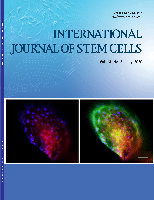
International Journal of Stem Cells
Scope & Guideline
Elevating the Dialogue in Stem Cell Science
Introduction
Aims and Scopes
- Stem Cell Biology and Therapeutics:
The journal emphasizes research on the biology of various stem cell types, including pluripotent and multipotent stem cells, and their potential therapeutic applications in regenerative medicine, such as tissue repair and organ regeneration. - Organoid Technology:
A significant area of focus is on the development and application of organoids, which are three-dimensional structures derived from stem cells that mimic organ functions. This includes guidelines for organoid manufacturing and studies on organoid systems for disease modeling. - Stem Cell Imaging and Characterization:
Research involving advanced imaging techniques to characterize stem cells and their differentiations, as well as the application of single-cell technologies to understand cellular heterogeneity within stem cell populations. - Stem Cell Engineering and Manipulation:
The journal covers methodologies for engineering stem cells, including genetic manipulation techniques like CRISPR/Cas9, to enhance their therapeutic efficacy and understand the underlying mechanisms of stem cell differentiation. - Stem Cell Interaction with Microenvironment:
Studies on how stem cells interact with their microenvironment, including immune interactions, extracellular vesicles, and the influence of biochemical signals on stem cell behavior and fate. - Clinical Applications and Safety Studies:
The journal publishes research on the clinical applications of stem cell therapies, including safety assessments, efficacy studies, and the challenges associated with translating stem cell research into clinical practice.
Trending and Emerging
- Advanced Organoid Models:
There is a noticeable increase in research focusing on organoid technology, with studies exploring the development of organoids from various stem cell types for applications in drug testing, disease modeling, and regenerative medicine. - Stem Cell Genomics and Single-Cell Omics:
The use of genomics and single-cell omics technologies is gaining momentum, allowing for a deeper understanding of stem cell heterogeneity, lineage tracing, and the regulatory networks governing stem cell behavior. - Stem Cell Therapy for Neurological Disorders:
An emerging focus is on the use of stem cells for treating neurological disorders, including applications of iPSCs in modeling diseases like Parkinson's and Huntington's, as well as exploring potential therapeutic avenues. - Immunomodulatory Properties of Stem Cells:
Research on the immunomodulatory effects of stem cells, particularly mesenchymal stem cells, is trending, highlighting their potential in treating autoimmune diseases and enhancing tissue repair. - Bioengineering and Stem Cell Applications:
There is a growing interest in bioengineering approaches to enhance stem cell therapies, including the development of biomaterials and scaffolds that support stem cell growth and differentiation. - CRISPR/Cas9 and Gene Editing Technologies:
The application of gene editing technologies, particularly CRISPR/Cas9, is increasingly prevalent in stem cell research, enabling precise modifications that enhance therapeutic potential or study disease mechanisms.
Declining or Waning
- Traditional Differentiation Protocols:
Research focused on basic differentiation protocols for stem cells has decreased as more sophisticated techniques, such as organoid formation and bioengineering approaches, gain traction. - Basic Stem Cell Characterization Studies:
There has been a waning interest in purely descriptive studies that characterize stem cells without applying them to therapeutic contexts or advanced applications. - Non-therapeutic Applications of Stem Cells:
Studies that focus solely on the basic biology of stem cells without direct implications for therapy or disease modeling are becoming less frequent as the field moves towards more applied research. - Limited Focus on Ethical Implications:
Discussions and studies addressing the ethical implications of stem cell research and therapies have diminished, likely due to an increased focus on technological advancements and clinical applications. - Non-embryonic Stem Cell Research:
Research on non-embryonic stem cells, such as adult stem cells, appears to be declining in favor of studies on induced pluripotent stem cells (iPSCs) and their applications.
Similar Journals
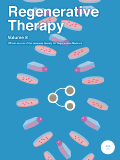
Regenerative Therapy
Fostering collaboration across disciplines in regenerative research.Regenerative Therapy is a premier open-access journal dedicated to advancing the fields of biomaterials, biomedical engineering, and developmental biology. Published by Elsevier in Japan, this journal has been an influential platform since its inception in 2015, contributing significantly to the global discourse on regenerative medicine. With an impressive Q2 ranking in major categories such as Biomaterials and Biomedical Engineering, it is recognized for its quality of research and innovation. Researchers seeking to disseminate their findings or explore cutting-edge developments will find Regenerative Therapy to be invaluable, reflecting current trends and fostering collaborations across interdisciplinary boundaries. The journal offers open access, ensuring that high-quality research is available to a broad audience and enhances the impact of scholarly work in the regenerative medicine community.

Stem Cells International
Exploring Breakthroughs in Stem Cell TechnologyStem Cells International is a premier open access journal published by HINDAWI LTD, focusing on the rapidly evolving field of stem cell research. With an ISSN of 1687-966X and E-ISSN 1687-9678, this journal has been a vital resource since its inception in 2010, showcasing innovative studies and breakthroughs up to 2024. Positioned in Q3 in Cell Biology and Q2 in Molecular Biology for 2023, as well as well-ranked in the Scopus database, the journal serves as an essential platform for researchers, professionals, and students dedicated to exploring the implications of stem cell technology in regenerative medicine and biological research. The open access model ensures wide accessibility, fostering collaboration and knowledge-sharing across the scientific community, making it a cornerstone in advancing the understanding and application of stem cell science.

Current Stem Cell Reports
Pioneering Discoveries in Molecular and Genetic BiologyCurrent Stem Cell Reports, published by Springer Heidelberg, is an esteemed academic journal that has emerged as a pivotal resource in the fields of Cell Biology, Developmental Biology, Genetics, and Molecular Biology. Since its inception in 2015, this journal has consistently contributed to the evolving discourse on stem cell research and its applications, providing a platform for innovative studies and reviews through 2024. With a notable impact indicated by its quartile rankings—Q2 in Developmental Biology and Genetics, and Q3 in Cell Biology and Molecular Biology—it engages a diverse audience of researchers, professionals, and students who seek high-quality, accessible research insights. Although offering a traditional access model, the content remains vital for those invested in understanding the implications of stem cell advancements. Located in Switzerland and operating from the heart of Heidelberg, this journal aspires to bridge gaps in knowledge and stimulate collaboration in the burgeoning field of stem cell science.

CELL AND TISSUE RESEARCH
Advancing the Frontiers of Cell Biology and Tissue DynamicsCELL AND TISSUE RESEARCH, published by Springer, is a premier journal dedicated to advancing the field of cell biology, histology, pathology, and forensic medicine. With a proud history dating back to its foundation in 1924 and continuing its legacy, this journal has established itself as a vital source for innovative research, facilitating the dissemination of significant findings that contribute to the understanding of cellular and tissue dynamics. Hailing from Germany, the journal exhibits an impressive standing in the academic community with a 2023 impact factor reflected in its category quartiles: Q2 in Cell Biology, Q1 in Histology, and Q1 in Pathology and Forensic Medicine. It ranks notably within multiple Scopus categories, including 32/208 in Pathology and Forensic Medicine and 13/62 in Histology, showcasing its high percentile rankings of 84th and 79th, respectively. Researchers, professionals, and students benefit from its extensive coverage and rigorous peer-review process that ensures the integrity and relevance of its published works, thus making it an essential resource in the scientific community. While it operates under a subscription model, its commitment to quality and impact makes it an indispensable journal for anyone engaged in cellular and tissue research.
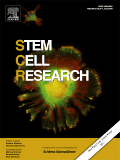
Stem Cell Research
Connecting researchers and practitioners globally.Stem Cell Research is a premier Open Access journal published by ELSEVIER, dedicated to advancing the understanding of stem cell biology. Since its inception in 2007, the journal has provided a platform for the latest research in the fields of Cell Biology, Developmental Biology, and Medicine, with its publication being accessible globally since 2014. Located in the Netherlands, the journal’s comprehensive scope aims to bridge fundamental discoveries with clinical applications, fostering collaboration among researchers and professionals. With a 2023 impact factor reflected in its Q4 ranking in Cell and Developmental Biology and a commendable position in the 64th percentile for General Medicine, Stem Cell Research remains a vital resource for those interested in the dynamic landscape of regenerative medicine. Targeting an audience that includes researchers, practitioners, and students, the journal emphasizes not only the significance of stem cells in medical science but also the ethical considerations and the public discourse surrounding stem cell research. Join the community committed to pioneering the future of stem cell science through rigorous peer-reviewed research.
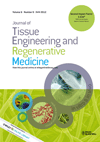
Journal of Tissue Engineering and Regenerative Medicine
Innovating solutions for a healthier tomorrow.Journal of Tissue Engineering and Regenerative Medicine, published by WILEY, stands as a pivotal platform in the fields of biomaterials, biomedical engineering, and regenerative medicine. With an ISSN of 1932-6254 and an E-ISSN of 1932-7005, this journal, based in the United Kingdom, has consistently delivered high-quality research since its inception in 2006, converging critical insights through 2024. With an impressive citation profile reflected in its Scopus rankings—specifically a rank of #58 in Medicine and #75 in Biomedical Engineering—the journal is acknowledged for its substantial impact, as demonstrated by its competitive quartile standings in 2023. Notably, it maintains a Q3 ranking in Biomaterials and Q2 in both Biomedical Engineering and Medicine (miscellaneous), showcasing its influence and relevance in the rapidly evolving interplay between engineering and medicine. The journal serves as a vital resource for researchers and practitioners aiming to stay abreast of innovations and breakthroughs in regenerative therapies, tissue scaffolds, and biomaterials. While not an open-access publication, it fosters academic dialogue and knowledge dissemination that is crucial for advancing the field.

BIOCELL
Unveiling the Secrets of Cellular InnovationBIOCELL is a distinguished peer-reviewed journal dedicated to the field of Cell Biology, published by TECH SCIENCE PRESS. Since its inception in 1995, the journal has been at the forefront of disseminating innovative research, with converged publication years extending from 1995 to 2013 and from 2015 to 2024. Although it currently holds a Q4 ranking in the Cell Biology category according to the 2023 category quartiles, BIOCELL aims to foster advancements by providing a platform for researchers, professionals, and students to share their findings in biochemistry, genetics, and molecular biology. The journal is available in both print (ISSN: 0327-9545) and digital formats (E-ISSN: 1667-5746) and seeks to attract contributions that enhance scholarly dialogue and understandings of cellular mechanisms and innovations. With a commitment to quality research and critical discourse, BIOCELL plays an important role in nurturing the scientific community within Argentina and beyond, offering vital insights that contribute to the advancement of the life sciences.

Cell Journal
Empowering Researchers with Open Access to DiscoveryCell Journal is a leading interdisciplinary publication in the fields of Cell Biology, Developmental Biology, Molecular Biology, and Reproductive Medicine, published by ROYAN INST since its inception as an open-access journal in 2007. With an ISSN of 2228-5806 for print and 2228-5814 for electronic editions, it provides a vital platform for researchers and professionals to disseminate innovative findings and insights that shape our understanding of cellular processes and reproductive sciences. The journal boasts an impressive Scopus ranking, achieving a Q3 position in both Molecular Biology and Reproductive Medicine, highlighting its significance in the academic community. Situated in Tehran, Iran, Cell Journal encourages global collaboration through its accessible content, making cutting-edge research available to a diverse audience. As it converges from 2011 to 2024, the journal continues to emphasize the importance of thorough scientific inquiry, fostering advancements that drive both theoretical frameworks and practical applications in cell science.
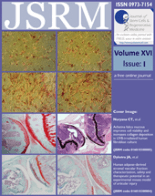
Journal of Stem Cells & Regenerative Medicine
Exploring the Frontiers of Stem Cell ScienceThe Journal of Stem Cells & Regenerative Medicine is a leading publication dedicated to the advancing field of stem cell research and regenerative medicine. Established in India and published by JOURNAL STEM CELLS & REGENERATIVE MEDICINE, this Open Access journal has been available since 2007, providing researchers and practitioners with free and unrestricted access to high-quality articles. With an ISSN of 0973-7154, the journal is indexed in Scopus, featuring a wide array of topics and insights into biochemistry, biotechnology, cell biology, and molecular biology, as denoted by its relevant quartile rankings. This journal is committed to bridging the gap between laboratory research and clinical applications, making significant contributions to the scientific community. The convergence of innovative studies from 2010 to 2024 positions it as an invaluable resource for those looking to stay at the forefront of stem cell and regenerative medicine research.

Stem Cell Research & Therapy
Empowering Innovation in Stem Cell ScienceStem Cell Research & Therapy is an esteemed international journal published by BMC, specializing in the rapidly advancing fields of stem cell research and regenerative therapies. Since its inception in 2010, the journal has embraced an Open Access model, ensuring that vital research is readily accessible to a global audience. With a significant impact in the scientific community, it holds Q1 quartile rankings in prestigious categories such as Biochemistry, Genetics and Molecular Biology, Cell Biology, and Molecular Medicine, highlighting its critical role in promoting groundbreaking research. The journal’s high Scopus rankings—placing it in the top echelons of its fields—reflect its commitment to publishing high-quality, peer-reviewed studies that advance our understanding of stem cell biology and therapeutic applications. Aimed at researchers, healthcare professionals, and students alike, Stem Cell Research & Therapy is an indispensable resource for those dedicated to the exploration and innovation within this transformative area of science.